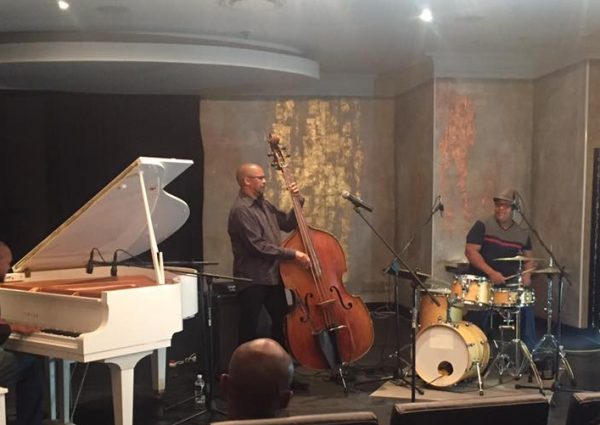ART STATE Editor Ace Moloi writes about The Curse of Teko Modise, a book about the life of Teko Modise, written by Nikolaos Kirkinis and published by Jacana Media.
The art of SA football
South African football is known for its theatrical displays of skill on the field. Tsamaya. Kupe. Shibobo. On and on the list goes. To us, football is first and foremost art before it is science. We play entertaining football, which nevertheless is not ignorant of the importance of results.
Though foreign coaches and commentators have unfortunately oversimplified our style of play as merely dramatic, the truth of the matter is that there’s more to how we play than meets the eye – and only the eye that’s looking will spot the magic.
This magic is in the waving free kicks taken by Steve “Chippa” Lekoelea. It’s in the roundabout of the now no more Emmanuel “Scara” Ngobese. The lordship of Doctor “16V” Khumalo. The wizardry of Thabo “Tsiki Tsiki” Mooki.
Insert the creativity of Teko “The General” Modise in this pack of wolves and the result is an authentic South African football experience, derived centrally from the township flair.
Teko Modise! A name that is as much suggestive as it is – to borrow church-speak – prophetic. Teko. Temptation. Tribulation. Curse.
The curse of Teko Modise
Teko Modise – as is black life – is a product of a broken family. His father, whom he remembers as an unflinching disciplinarian, perhaps overly, is no different from the black man as colonialism and apartheid have recreated him for us: absent physically and emotionally, harsh on his children to perform miracles he failed to accomplish in his time, verbally and physically abusive.
Seeking to derive existential meaning from his little boy, Teko’s father snarled at his boy’s interest in soccer, and prodded him to the direction of education.
Of course reading this part of Teko’s book requires lived context and compassion for the father, especially because to him this could have been a love language: a fulfilment of the injunction to lead and protect his son; to show him the ways of righteousness, so to speak.
Righteousness, I say. Yho!
Teko’s father committed the highest act of unrighteousness when he kicked him out of their home to ultimately (after a failed attempt to be taken in by his nearest relatives) fend for himself in the streets.
Thank God it wasn’t for too long until his otherwise strayed mother learnt about her child’s homelessness, took a deep breath, and tried to hold it on the cutting edge again.
Thus began Teko’s fate of home-hopping and a crisis of belonging, which affected crucial years of his development, and went on to define him until he could stand on his feet.
Soweto: the township of townships
I’ve always contested that Soweto bequeaths its residents with a certain unseen yet felt privilege over other blacks in the country. In almost all industries of talent, if you are not from Soweto you are incomplete.
Perhaps an absent-minded doing of history, or a deliberate township branding move, what remains is that a child from Qwa-Qwa is not exposed to the kind of opportunities his Daveyton or Zola counterparts have at their disposal.
Generally, black South African life seems to be only legitimate if it is depicted through the eye of Soweto. Let me stop politicking from the periphery of Bloemfontein. The centre must always hold!
Nikolaos Kirkinis, the narrator of Teko’s story, aptly captures the hopes, dreams and anxieties of aspiring footballers in the township. It is a common story, to be honest. I think over and above all else, this part of the book is the one that touched me profoundly. This is because, like Teko and his peers, I too grew up with visions of myself as a soccer star.
Of this period in my life, I said in my book Holding My Breath:
“To be a professional footballer was my all-consuming dream, and I knew I had the talent to back it up. Gradually, however, I began to realise that aspiring village footballers could not easily break out of the amateur football ranks into a professional career.”
“At weekend tournaments in my village I marvelled at the talent on display . . . but most of it went to waste. Scouts from the big teams were rarely invited to these rural tournaments, and very few footballers in mainstream football hailed from Qwa-Qwa.”
As a belated thought, I’ve realised that even our own Free State Stars was made up of a quite few players who were from Qwa-Qwa in my days of soccer goals.
Winners don’t quit, but despair is real
Nikaolos details Teko’s journey towards mainstream recognition through a series of trials that he attended together with his peers. He paints a clear image of what it takes to pursue a dream. He writes with a powerful sense of pathos that makes the reader – well, at least me – see themselves in the shoes of a young Teko, under the mocking heat of the day, failing from trial to trial, yet dreaming on and on.
They say true winners never quit, but despair is real. Sometimes life freezes on you. Everything means nothing. Teko too experienced the brutality of hopelessness when most of his peers were selected, and he wasn’t.
The author tells it as though it’s a tale of a woman who is everybody’s maid of honour but has no hope of her own wedding day. Of an artist that constantly retweets other people’s good news while their own breakthrough seems distant, if not nowhere to be seen.
Life’s a people’s game
You cannot finish reading The Curse of Teko Modise and not walk away with a lesson about the importance of healthy human relationships. From the connections Teko made in his childhood days in the streets and his cheerleaders on the field of play to his first deal at City Pillars and his relationship with the likes of Jazzman Mahlakgane and Pitso Mosimane, the pattern is loud.
But Teko’s life has not been without selfish associations. In a chapter I rate among my favourites – Downgrade Everything – the writer records a period in Teko’s life when he was advised to downgrade his lifestyle in order to sieve his friendships.
Furthermore, most of his romantic relationships collapsed because of either incompatibility or the pursuit of self-aggrandizement using his fame. Plainly, he has attracted a mob of parasites that loved him for what he had and not who he is.
Trust diminishes when you find yourself in this situation. When your wife makes false claims about you in the media, who do you trust? When you meet a new person and finally think there’s movement here, and she turns out to be suffering from a diarrhoea of demands, surely you shrink into yourself? When a partner hides your passport and almost costs you and your country an international glory just because she feels jealous of your increasing prominence, are you really meant to be with anyone?
It is this glitz and glamour that mined his father from beneath the surface to go in the media and seek to shame him. It is this glow that earned him regular calls from his mother, asking for all manner of things. Money makes people come around!
There’s a lot that happened in Teko Modise’s life when his career seemed to be plummeting. A religious cult spied on him prophetically and recruited him to join. When the phase ended, a certain king from Congo turned him into his muse for his magic. Both these instances involved serious money: in and out of his account.
The blessing of Teko Modise
Trying to capture the contents of this book is as arduous a task as undertaking to write a book about someone as significant as Teko Modise in South African football. Like the book did, you’ll have to tour down the years of amateur football, rise through the commercial ranks, study the modus operandi of big teams such as Orlando Pirates, and understand the sacredness of a national call-up.
Not only that, but this commitment requires a comprehensive appreciation of the notoriety of fame and the misfortune of fortune to a young man of Teko’s background. Again, the book dispenses this information.
True, the author is not the best biographer in the land, judging by how he framed the narrative. Some gaps you have to fill yourself. Some conversations are your responsibility to enlarge. But he gives you the tools you need, and I suppose this makes all the difference. Right?
Much can be said about Teko. But only history can make conclusions. What we have in him is an icon of our excellence. A legend of the 2010 FIFA World Cup. A dazzling player. A national blessing. A broken man.
Ace Moloi is the editor of ART STATE and author of Holding My Breath






